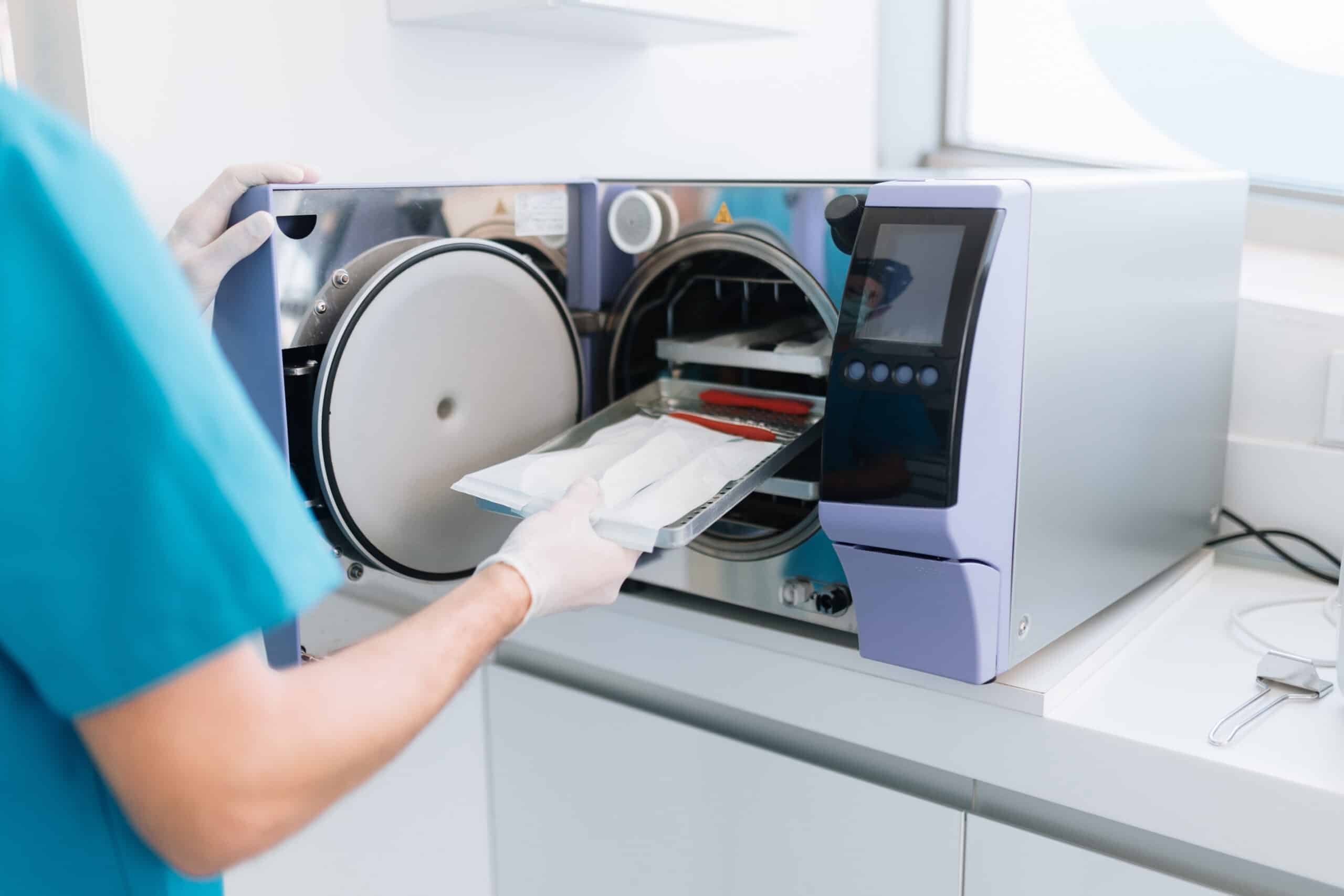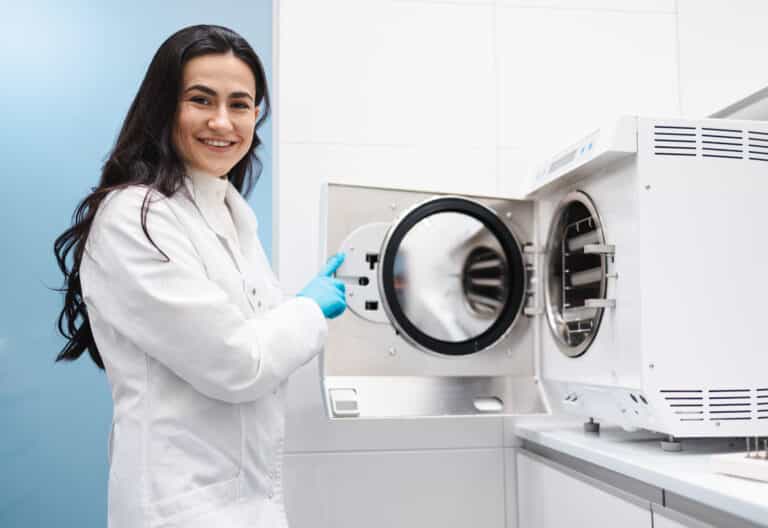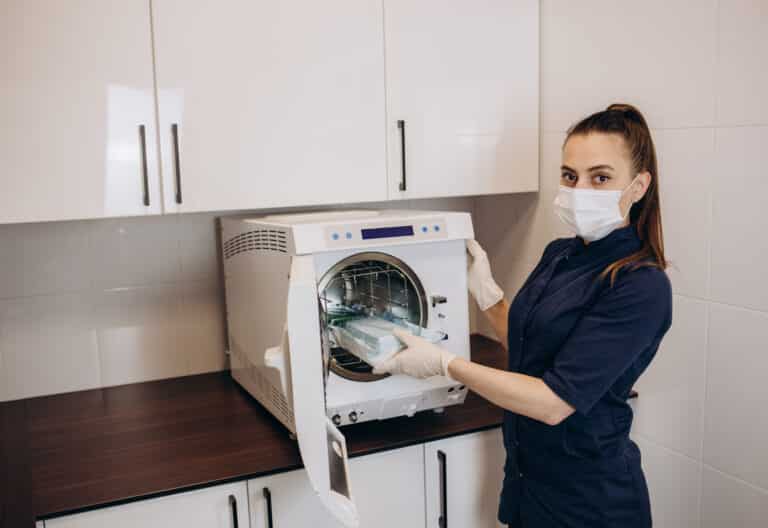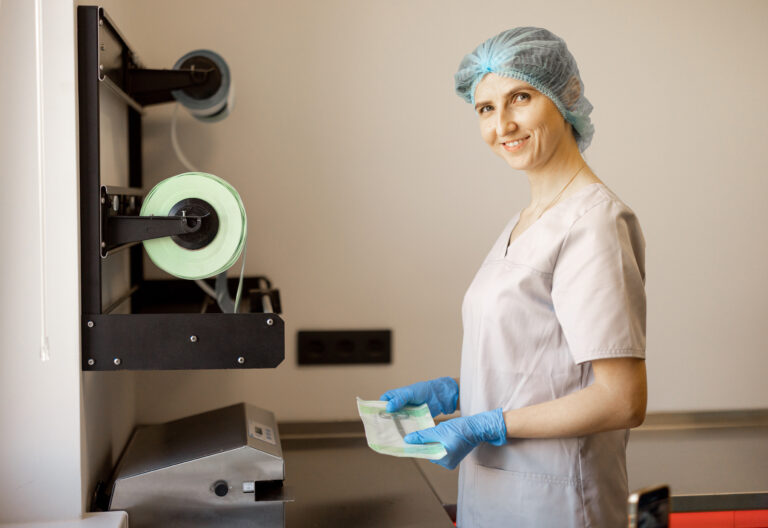If you’re considering a career as a Sterile Processing Technician, it’s important to understand the requirements needed to enter and excel in this field.
Sterile Processing Technicians are very crucial in healthcare since they are the backbone of patient safety in any healthcare setting.
So, in this article, we’ll discuss about Sterile Processing Technicians, their duties, and the requirements to start this career, and we’ll try to answer some trending FAQs.
Plus, we’ll also try to show you a path where you can fulfill all the requirements in a single place, and become job-ready faster.
So, let’s get started…
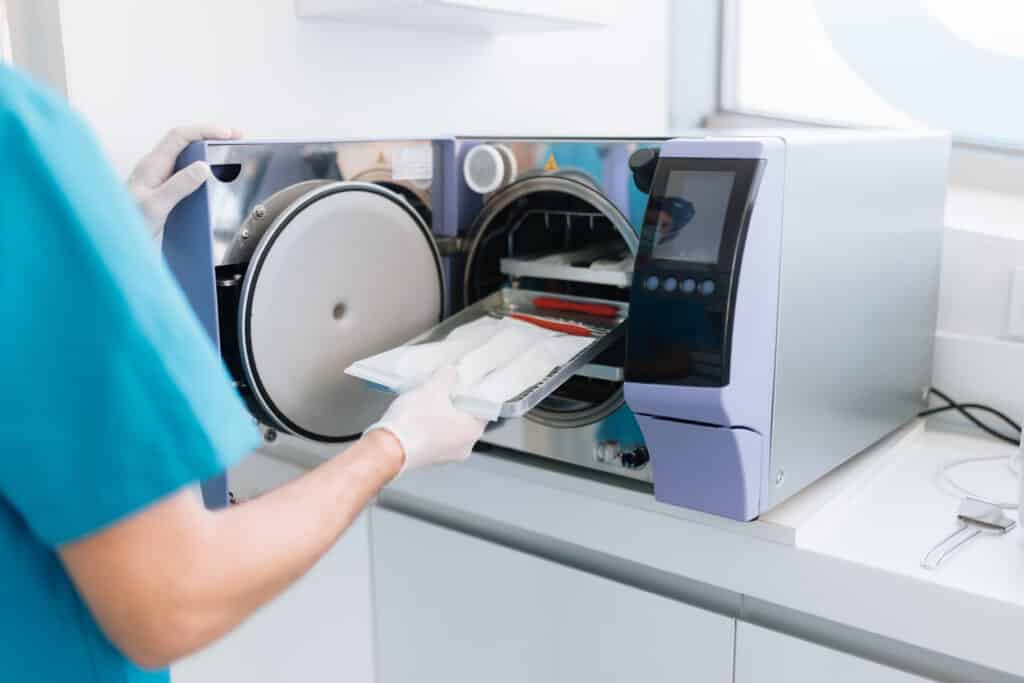
What is a Sterile Processing Technician?
Sterile Processing Technicians are vital members of the healthcare team, ensuring that surgical instruments and medical equipment are safe, sterile, and ready for use.
They are the backbone of patient safety in various healthcare settings, from big hospitals to smaller private clinics.
They ensure the safety and effectiveness of medical procedures by maintaining the sterility of instruments used in surgeries and other medical treatments.
What do they do?
A Sterile Processing Technician is a healthcare professional responsible for decontaminating, cleaning, sterilizing, and assembling medical instruments and equipment.
Their work supports the smooth operation of medical procedures and helps prevent infections, contributing significantly to patient safety and overall healthcare quality.
Here are the duties of a Sterile Processing Technician:
- They meticulously clean and decontaminate medical instruments and equipment, removing all residues to prevent infections.
- They operate specialized sterilization equipment to ensure that medical instruments are free of harmful microorganisms.
- They assemble and package sterile instrument sets according to specific guidelines to maintain sterility.
- They manage inventory levels by ordering, organizing, and restocking sterile supplies and instruments.
- They participate in quality assurance by monitoring sterilization processes and conducting equipment maintenance checks.
- They collaborate with healthcare professionals to ensure the timely delivery of sterile instruments and address any related concerns.
Read:
-> What is a Sterile Processing Technician?
-> What Does a Sterile Processing Technician Do?
-> How to Become a Sterile Processing Technician?
Sterile Processing Technician Requirements
Sterile Processing Technicians play a crucial role in the healthcare system. They are responsible for ensuring that medical instruments and equipment are properly cleaned, sterilized, and prepared for use in surgeries and other medical procedures.
So, if you want to become a Sterile Processing Technician, then you need a combination of many things, like education, experience, certification, and skills.
Now, let’s discuss each of the requirements in detail:
Education Requirements
To become a Sterile Processing Technician, you typically need to meet certain educational requirements.
The requirements are as follows:
You need to hold a high school diploma
The first step to becoming a Sterile Processing Technician is obtaining a high school diploma or a GED equivalent. This foundational education is essential as it provides the basic knowledge and skills needed to pursue further specialized training.
Post-Secondary Education
If you hold a high school diploma then you can enroll in a Sterile Processing training program.
While this is not always mandatory, but nowadays employers prefer candidates who have completed a post-secondary education program in sterile processing.
Community colleges, vocational schools, technical institutes, and online platforms offer these programs.
They typically last from a few months to a year and cover various aspects of sterile processing, including – Anatomy and Physiology, Microbiology, Sterilization Techniques, Decontamination Procedures, Infection Control, Inventory Management, and so on.
Now, while selecting a Sterile Processing Technician program, it’s crucial to ensure that it is accredited by the Commission on Accreditation of Allied Health Education Programs (CAAHEP) or the Accrediting Bureau of Health Education Schools (ABHES).
Accreditation ensures that the program meets industry standards and provides a quality education that prepares students for their careers. Graduating from an accredited program is also often a requirement for certification and employment.
Experience Requirements
Gaining experience allows students to apply what they’ve learned in the classroom to actual sterile processing procedures.
Many sterile processing programs include hands-on clinical training, which is crucial for gaining practical experience. During this training, students work in real healthcare settings under the supervision of experienced professionals.
This allows them to apply their theoretical knowledge to real-world situations, developing their skills in cleaning, sterilizing, and handling medical instruments.
This exposure is invaluable for building confidence and competence in the field.
Certification Requirements
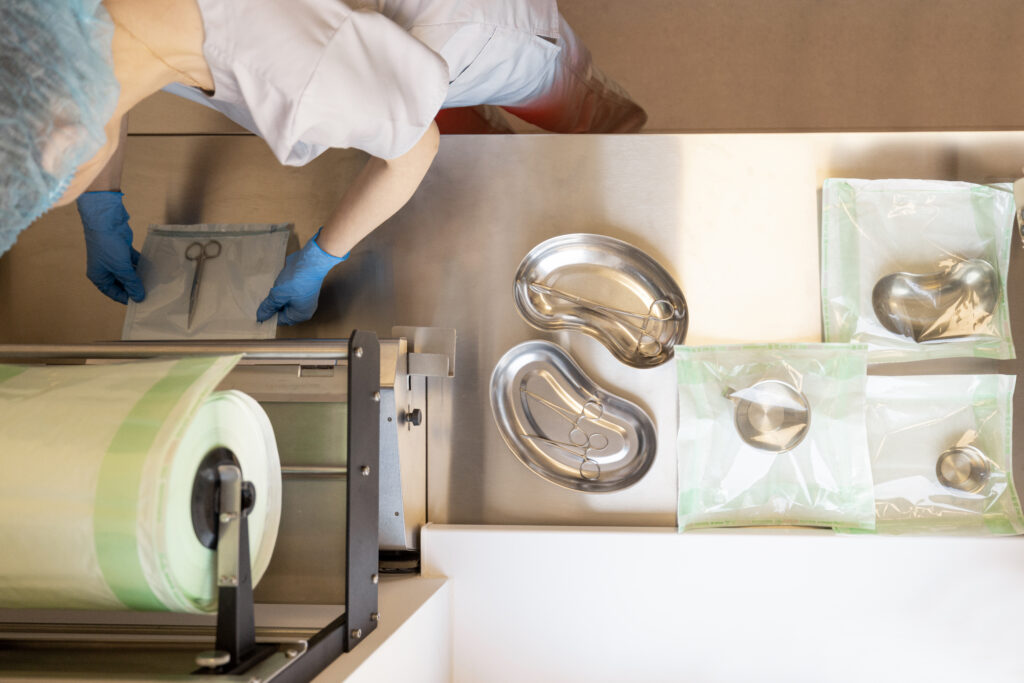
Certification is not always a legal requirement, but it is highly recommended and often preferred by employers. It demonstrates a commitment to the profession and a higher level of competency.
Certified technicians are generally considered more qualified and are often given preference during the hiring process.
If you want to become a Sterile Processing Technician, you should get certified, and to get eligible for that you have 2 ways. The first way is by getting a year of experience and the other popular way is by getting some formal education.
Regardless of the way you choose, you should get certified and for that, you have many certification options, each offered by different certifying organizations:
CRCST Certification
The Certified Registered Central Service Technician certification is offered by the Healthcare Sterile Processing Association (HSPA).
This certification is the most popular certification option among the sterile processing techs nationwide. To get CRCST certified you need to pass the CRCST exam covering various aspects of sterile processing.
Also Read:
-> Certified Sterile Processing Technician
-> Sterile Processing Technician Certification Online
Skills Requirements
To become a Sterile Processing Tech, besides education, experience, and certification, you should also possess certain skills.
Now, you might have some skills as innate, while the others you’ll develop during your training program.
Here are the skills:
Attention to Detail
Sterile Processing Technicians must be meticulous and detail-oriented, as even a small mistake can have serious consequences for patient safety. They need to follow strict protocols and guidelines to ensure that instruments are properly cleaned, sterilized, and assembled.
Technical Proficiency
Proficiency in operating and maintaining sterilization equipment is essential. Sterile Processing Technicians must be comfortable using autoclaves, ultrasonic cleaners, and other specialized devices to ensure effective sterilization.
Organizational Skills
Good organizational skills are crucial for managing inventory, tracking supplies, and ensuring that sterile instruments are readily available when needed. Sterile Processing Technicians must keep detailed records and maintain an orderly workspace.
Communication Skills
Effective communication is important for collaborating with other healthcare professionals. Sterile Processing Technicians need to understand and respond to the needs of surgeons, nurses, and other medical staff to ensure that the right instruments are available for procedures.
Problem-Solving Abilities
Sterile Processing Technicians must be able to troubleshoot equipment issues, address problems with sterilization processes, and find solutions to ensure continuous workflow. Quick thinking and the ability to stay calm under pressure are essential traits.
How to get all the requirements and become job-ready faster?
Hopefully, you now know that becoming a Sterile Processing Technician requires a combination of education, certification, practical experience, and essential skills.
To become job-ready faster you need to get all these requirements faster. For that, you should try to find the right Sterile Processing Technician training program.
The right training program would not only help you meet the requirements – education, experience, skills, and certification but also help you to stand apart from the competition.
Here’s one such program that helps you become job-ready faster and puts you in a league of your own.
Also Read:
-> Sterile Processing Technician Training Course
-> Sterile Processing Technician Schools
-> Sterile Processing Technician Certificate Program
-> Sterile Processing Technician Training Program Cost
Preppy’s Sterile Processing Tech Certification Training Program
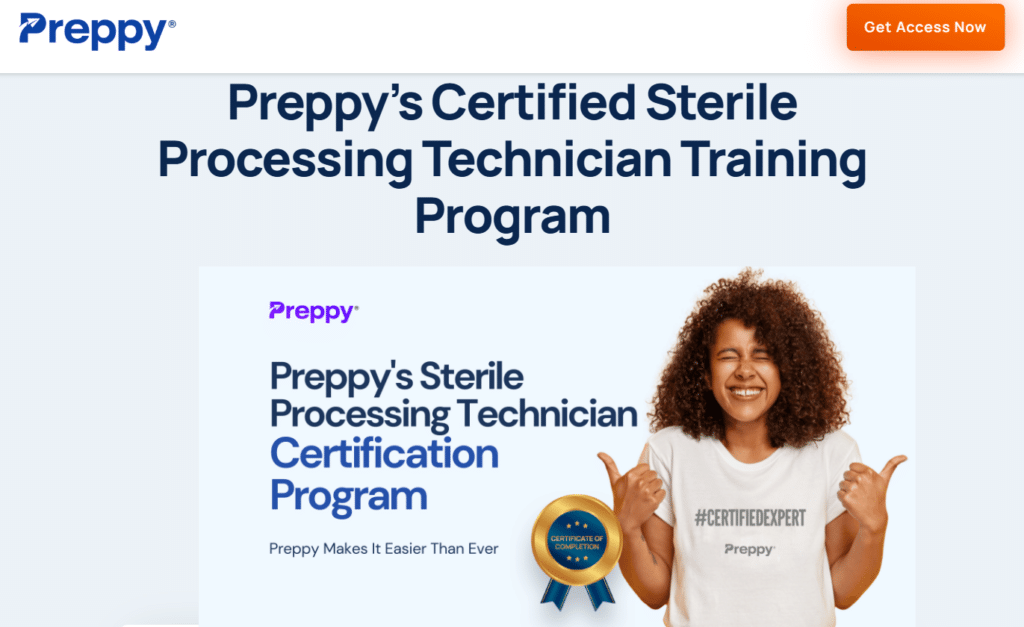
Preppy is an amazing online education platform that is helping aspiring Sterile Processing Technicians nationwide to start their career faster in as little as 4 months.
With Preppy’s Sterile Processing Technician training program, you get –
- Accredited online education from the comfort of your home at your own pace and on your schedule.
- A university certificate from the reputed, non-profit, 150-year-old University after you finish your Sterile Processing Technician training.
- A thorough curriculum so you can become ready for the CRCST Certification exam.
- An externship opportunity at a local healthcare facility, for the clinical experience that you need as a Sterile Processing Technician.
- Faster course completion in as little as 120 Days.
- As a bonus, you get a free laptop and it’s yours to keep even after you’re done with the course.
- Lastly, Preppy’s Sterile Processing Technician certification training program is insanely affordable and will cost you just $1599, all-inclusive.
So with Preppy, you become job-ready faster by fulfilling all the requirements enrolled in one single program at an insanely cheaper tuition cost.
In the end, if you want to become a Sterile Processing Technician faster, learning from the comfort of your home without driving to college or without any student loans, by enrolling in an accredited program where you get a university certificate, externship placement, certification-ready, in less than 180 days, at an affordable price, then check out our Program.
FAQs – Sterile Processing Technician
What is the job outlook of a Sterile Processing Technician?
According to the U.S. Bureau of Labor Statistics, the job outlook for Sterile Processing Technicians (Sterile Processing Technicians) is positive. Employment for medical equipment preparers, which includes Sterile Processing Technicians, is expected to grow by approximately 8.3% from 2020 to 2030.
This growth translates to around 7,900 new job openings in the field, making it a promising career choice for those entering the healthcare industry.
Which healthcare setting employs Sterile Processing Technicians the most?
Sterile Processing Technicians are essential in various healthcare settings, ensuring the cleanliness and sterility of medical instruments.
Here’s a breakdown of the top healthcare settings employing Sterile Processing Technicians:
General Medical and Surgical Hospitals
The majority of Sterile Processing Technicians, approximately 46,330, are employed in general medical and surgical hospitals. These facilities require a high volume of sterile instruments for numerous procedures, making Sterile Processing Technicians indispensable.
Offices of Dentists
Around 5,010 Sterile Processing Technicians work in dental offices, where maintaining sterile instruments is crucial for preventing infections during dental procedures.
Outpatient Care Centers
These centers employ about 4,140 Sterile Processing Technicians. As outpatient care continues to grow, the demand for Sterile Processing Technicians to manage and sterilize instruments also increases.
Offices of Physicians
Approximately 3,350 Sterile Processing Technicians are employed in physician offices, supporting various medical practices by ensuring instruments are properly sterilized and ready for use.
Employment Services
Employment services employ around 1,980 Sterile Processing Technicians, placing them in various healthcare facilities that require temporary or permanent sterile processing support.
These are the diverse work settings where Sterile Processing Technicians play a crucial role in maintaining high standards of hygiene and patient safety.
What is the earning potential of a Sterile Processing Technician?
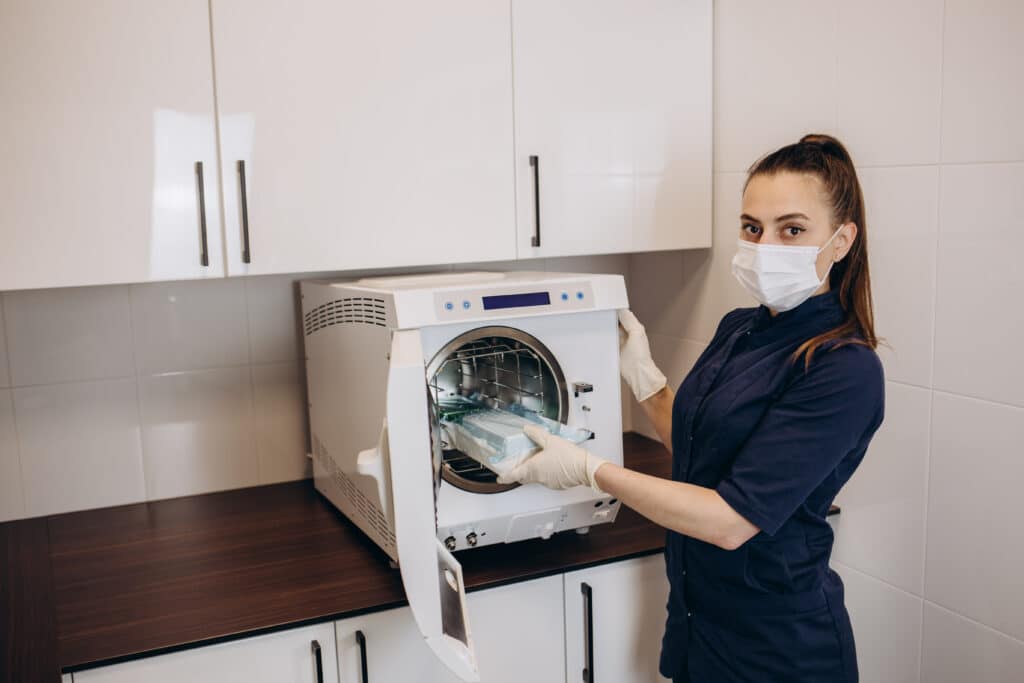
According to the U.S. Bureau of Labor Statistics, medical equipment preparers, including Sterile Processing Technicians, earn an average salary of $47,410 per year, which is equivalent to $22.79 per hour.
This decent salary reflects the vital role Sterile Processing Technicians play in ensuring the safety and efficiency of healthcare operations.
However, the salary for Sterile Processing Technicians can vary based on factors like location, experience, and the type of healthcare facility where they work.
You May Also Like:
-> Sterile Processing Technician Salary
-> Sterile Processing Technician Resume
-> Sterile Processing Technician Job Description
Which State Pays Sterile Processing Technicians the Most?
The earning potential for Sterile Processing Technicians varies significantly across different states.
Here are the top five states that pay Sterile Processing Technicians the most:
#1 California
Hourly Wage: $29.70
Annual Salary: $61,780
#2 District of Columbia
Hourly Wage: $28.28
Annual Salary: $58,830
#3 Alaska
Hourly Wage: $26.44
Annual Salary: $55,000
#4 New Jersey
Hourly Wage: $25.23
Annual Salary: $52,480
#5 Delaware
Hourly Wage: $25.22
Annual Salary: $52,450
These 5 states offer the highest compensation for Sterile Processing Technicians, reflecting the demand and cost of living in these areas. California leads the list, providing the highest salaries for the Sterile Processing Technicians.
However, the earning potential is also greatly influenced by the program you have enrolled in and other factors like certification, experience, and skills.
So to get all of these things in one single program, and to become job-ready faster in less than 120 days check out our Sterile Processing Technician training program.
RELATED:
-> Sterile Processing Technician Exam
-> Travel Sterile Processing Technician
-> Sterile Processing Technician vs. Surgical Technologist
-> How Long Does it Take to Become a Sterile Processing Technician?
